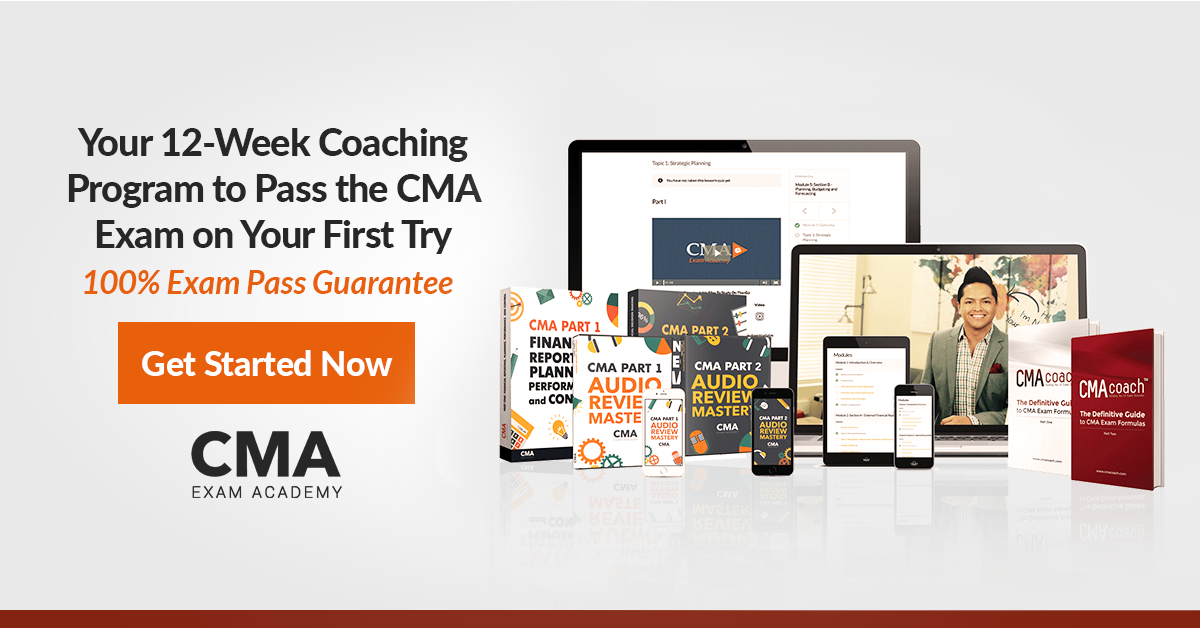One of the most difficult challenges we need to overcome when we want to become a CMA (Certified Management Accountant) is actually getting started in the first place.
For those in the world of accounting and finance, how to become a CMA is a challenge many students and professionals face. Everybody procrastinates; however, if you take the following steps, you can ensure you convert your dream into reality starting today.
1. How important is it?
One of the first questions people ask is how to become a CMA?
You need to introspect and first ask why you want to earn this prestigious designation. Having a clear understanding of your why will help you keep moving forward when it gets tough.
Once you are clear on that front, you will be more determined to make it happen and develop an execution mentality.
2. Clean up your environment
Everyday life can be noisy and hectic – ie. distracting. It’s essential that you remove any distractions so it becomes easier for you to concentrate on the task at hand. Until you complete your CMA test prep, surround yourself with things that remind you of your goal and nothing else.
Creating a vision board helps a ton. A vision board in its simplest form is a collage of images/pictures that will remind you of your goals and dreams. Don’t use a picture of the CMA logo in it, unless it really inspires you. Instead use images of the benefits you hope to get after earning your designation i.e. higher salary, respect, promotion, etc.
3. No excuses
Your first priority must be to plan and prepare for your CMA exam and not wait until you have enough spare time. No more “I’ll get to it tomorrow”s and “Just one more episode of TV.” Do not fall into the trap of giving excuses.
There will always be something else to do. It all starts with a personal commitment to really pursue this designation and make the necessary short term sacrifices for long term benefits.
This WILL be one of those things you’ll look back 10 years from now and thank yourself for.
4. Meditate
For the uninitiated, meditating for a few minutes every day helps your concentration levels so that you can laser your focus and cut out the distractions that come in the way.
5. Get rid of plan B
A counter-intuitive strategy is to not have anything to fall back upon. Once you are aware that there is no safety net, it makes you put in more effort and work harder towards accomplishing your goal.
6. Visualize the end goal
A powerful technique used by many professionals is to clearly imagine how success would look like and think backward from there. Again, create a vision board.
“Formulate and stamp indelibly on your mind a mental picture of yourself as succeeding. Hold this picture tenaciously. Never permit it to fade. Your mind will seek to develop the picture… Do not build up obstacles in your imagination.”
– Norman Vincent Peale
7. Pain = Action
A slightly difficult strategy, but if you can get yourself to withhold certain desires or benefits until you complete a particular chapter in your course then that deterrent can work wonders on your productivity.
I love muffins. Especially when I’m having coffee. So I would withhold my desire for a muffin until I scored 80% on my mock exam. It’s such a small thing but it really worked, and I believe it’ll work for you too. Not the muffin part but you get my point.
8. Self-discipline
The best motivation is the one that comes from within. The more you rely on external events and forces to get you into action mode, the more difficult it will be to be interested in it every single day.
Like I said before, it all starts with a personal commitment.
9. Have deadlines
You can keep certain deadlines for certain milestones. That way you will know exactly how much time you have to complete a particular task and the ticking clock will move you into action.
Having a solid study plan will do wonders for you here. Nothing like knowing when to study each section of the book and for how long.
10. You can’t be perfect
Once you have understood a concept in your head, do not waste time trying to perfect it by memorizing it. The grasping of it is more important than replicating it during the exam.
11. Reward yourself
After you complete a few sets of problems, reward yourself with something that makes you look forward to having it again when you complete the next set of problems. Remember my muffin example above? It’s the simple things.
12. Now is better than later
If something can be completed in 5-10 minutes then the best time to do it is now. Do not delay small progress for a later date. It could be something as small as planning your next week’s study plan.
“My advice is to never do tomorrow what you can do today. Procrastination is the thief of time.” – Charles Dickens
13. Kill your mood
Your moods will often play spoilsport which will lead to procrastination. Identify them when they arise and understand what you can do to overcome those moments of mental fatigue.
14. Hold yourself accountable
Commit this goal to a trusted friend or colleague who can act as a reminder that you need to stay on track and be more disciplined about your studies.
15. Stop playing the victim card
You are not a victim of your circumstances. You can mold or change any situation to your advantage if you have the mind-set to do so. Playing a victim will only make you feel sorry for yourself and won’t get you anywhere.
16. Small things matter
If you find yourself having a few minutes of idle time of waiting then you can use those by quickly going through notes in your head that you studied recently.
17. No negativity
Think positive thoughts and shun any negative thinking before it sidetracks you from achieving your goal.
18. Track your progress
Every time you complete a chapter, make note of it. Do this regularly to help you review your learning process and give you the motivation to complete the remaining study material.
19. Do not question your ability
If you constantly ask yourself whether you can become a CMA or how to become a CMA then that thinking will hamper your actual preparation. Quit double-questioning!
20. Keep calm and become a CMA
Ultimately, it’s only about taking small steps and daily efforts to get you to become a CMA. There is no magic formula or big break that you need. Focus on maximizing each day’s preparation.
Even if you only feel comfortable implementing half of these strategies, you’ll be surprised how much more productive your study sessions will be and how much more effectively you make your way through your CMA designation.
” Success is not obtained overnight. It comes in installments; you get a little bit today, a little bit tomorrow until the whole package is given out. The day you procrastinate, you lose that day’s success.” – Ishraelmore Ayivor
How will YOU kick procrastination to the curb? Share in the comments section below.
Back to frequently asked questions

Hi, I’m Nathan Liao (aka the CMA Coach)! For the last 10 years, over 82,000 accounting and finance pros came knocking at my door seeking guidance and help. If you’re also aiming to conquer the CMA exam on your very first try—without wasting away time or money—you’ve found your ultimate guide. Dive in deeper to discover more about me and the dedicated team that powers CMA Exam Academy. Click here and let’s embark on this journey together!



11 Comments on “20 Ways to Kick Procrastination to the Curb and Become a CMA”
Hi nathan
I’m a cma inter student. I have failed 3 times already. Should I quit or join something else?
Hi Ayushi,
So sorry to hear the news. Don’t give up. You’re closer than before because now you have a strong foundation compared to the first time you took the exam.
Here’s an article I wrote to help candidates retake the exam and succeed: https://cmaexamacademy.com/retaking-the-cma-exam/
Pingback: 15 Tips on How to Study for the CMA
Pingback: Taking the CMA Exam In 2015? Here's Your Roadmap
Nathan,
You’ve mentioned that scoring 50% out of the multiple choice questions (MCQ) are required to advance to the essay round of questions. Also, you’ve mentioned that MCQ are 75% of the total score (of 500) which implies that around 187.50 would be the score to advance to the next round. However, I have failed the CMA part 2 exam with a score of 190 – I didnt get the opportunity to advance to the essay round. As such, I am deeply disturbed. Does ICMA actually strictly comply with these percentages that they publish or is there always some variation?
Hi Renwick,
Yes, the grading system is uniformly applied by ICMA to all examinees. There is no exception (variation).
Let me know if you need more help.
Thanks,
Nathan
Pingback: The Ultimate Toolkit Every CMA Candidate Needs to Pass the Exam - CMA Coach
Hi Nathan,
Been taking part 2 for 4th time this Feb 9. I haven’t started studying since I failed last Oct 29, 2014.
Again I feel I don’t have much time. This is my last chance to pass the CMA otherwise my Part 1 will be forfeited. Appreciate if you can guide me by giving frame study plan targeting Feb 9, 2015 as the exam date covering the whole part 2. And of course your “words of wisdom” for aspiring CMAer that inspires me every now and then.
Thank you and cheers,
Amor.
Amor,
What I would do is take the total topics you haven’t studied yet, divide the total by the number of weeks remaining before your exam day, and that’s your study plan. You’ll know how many topics to study each week in order to complete the textbook.
Hi Nathan,
I have a quick question concerning registration with the IMA. I am interested in taking the CMA exam around Feb 2015 but have yet to register membership with the IMA, which I am planning to do soon. Can I actually register and pay now (Dec 2014) for the membership of 2015 or do I have to wait until 1 Jan 2015 to register and make the payment?
Thank you for assistance and the great site you have put up here.
David,
I believe you can pay now if you’d like. But give them a call before registering to be sure: https://www.imanet.org/about-ima/contact-us?ssopc=1